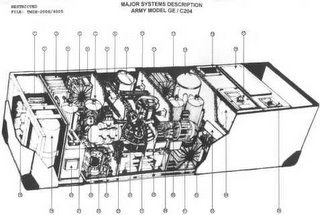Greetings. I am a time traveler from the year 2036. I am on my way home after getting an IBM 5100 computer system from the year 1975. My "time" machine is a stationary mass, temporal displacement unit manufactured by General Electric. The unit is powered by two, top-spin, dual-positive singularities that produce a standard, off-set Tipler sinusoid.
Sounds like the start of a science fiction novel or movie, doesn't it? It's not. The above is a post made on an Internet message board by "John Titor" on January 27, 2001. Over the next few months he talked online with skeptics and believers before stating that he was returning to his own time on March 24, 2001. He was never heard from again.
 People claiming to be time-travellers are not unheard of, especially with the anonymity of the Internet. What made John stand out was his ability to describe the theories and physics behind time-travel that fit into existing concepts of spacetime, and black holes. He even posted pictures of his device, and technical manuals accompanying it.
He stated that time paradoxes like the grandfather paradox did not exist, but that the Everett-Wheeler model (Many-Worlds Interpretation) - of a multiverse in which all possible actions are carried out - is correct.
People claiming to be time-travellers are not unheard of, especially with the anonymity of the Internet. What made John stand out was his ability to describe the theories and physics behind time-travel that fit into existing concepts of spacetime, and black holes. He even posted pictures of his device, and technical manuals accompanying it.
He stated that time paradoxes like the grandfather paradox did not exist, but that the Everett-Wheeler model (Many-Worlds Interpretation) - of a multiverse in which all possible actions are carried out - is correct.
Most people were of course very skeptical about Titor's claims. He in turn would often state he was not concerned whether people would believe him, and rather assumed people wouldn't - "What would it take for you to believe in a time traveller?" Skepticism, he said, was what made discussions interesting, rather than people accepting every word he said. He stated his purpose was to gauge the reaction of people to him. Some critics observed he would often parry the most direct questions posed to him, and reflect them on the questioner. But to his credit he did answer many questions about time and time travel, and the future.
Titor made a number of predictions about the future. Some, set in the near future, appeared on surface to bolster his claims as they came to pass. He mentioned that CJD (mad cow disease) would become more widespread but be played down, that Iraq would be accused of possessing nukes, and that the US government would begin to sacrifice civil rights for security (bear in mind his posts predated 9/11). He also knew obscure details, like certain UNIX systems having a year 2038 bug, and the IBM 5100 having hidden functions. He even hinted that the anticipated y2k bug problems did not come to pass because of future invervention.
He often described the philosophies and cultures of his time:
The war had very profound affects on people and how they relate to each other. As individuals, almost everyone in 2036 is very familiar with death. We all have stories of loved ones that have died from disease, war or acts of inhumanity. Most of us have even taken part in dishing the same thing out to the other side. As a result, we have become far more compassionate to the ones we love but mush less forgiving to those who don’t pull their weight. We are more accepting of other’s differences in our community because we depend on them to survive. We are also more conservative with our resources and closer to God because for a period, life on Earth was Hell.
The other major difference is in the concept of good and evil. With multiple worlds come multiple decisions and outcomes. For every good act, there is an equal and possible bad act on another worldline. Taken to the extreme, this must mean that in God’s eyes, there is no total good and total bad in the superverse. It balances itself out to infinity. I believe we are judged on the decisions we make as individuals and the good/evil I see on my worldline is an illusion that has no worth to God. My reaction to it is what’s important to God. Although this may seem rather heartless, it does allow me to see past the evil that people do and acknowledge the core of potential goodness inside them.
He also made apocalyptic statements about the future: Civil war in the US starting 2004-2005, and a third World War in 2015 which would see the US barraged by nukes. At the same time he stated that because worldines diverged (he estimated a divergence of 2% between our world and his), nothing was set in stone and we still could avoid the bleak future he knew. Skeptics observed that this made most of his claims impossible to verify, others said he was bringing a message of hope.
Was John Titor a hoax? Probably. His depiction of the future suspiciously mirrored popular science fiction themes, 2005 has passed with no signs of an American civil war, and his explanations of how his time machine worked was mercilessly shot down by science experts. But his story still entertains, and sparks thought about the direction that the human race is taking, sort of like what War of the Worlds did on radio in 1938. Time-traveller or storyteller, the tale of John Titor remains a memorable Internet legend.

0 comments:
Post a Comment